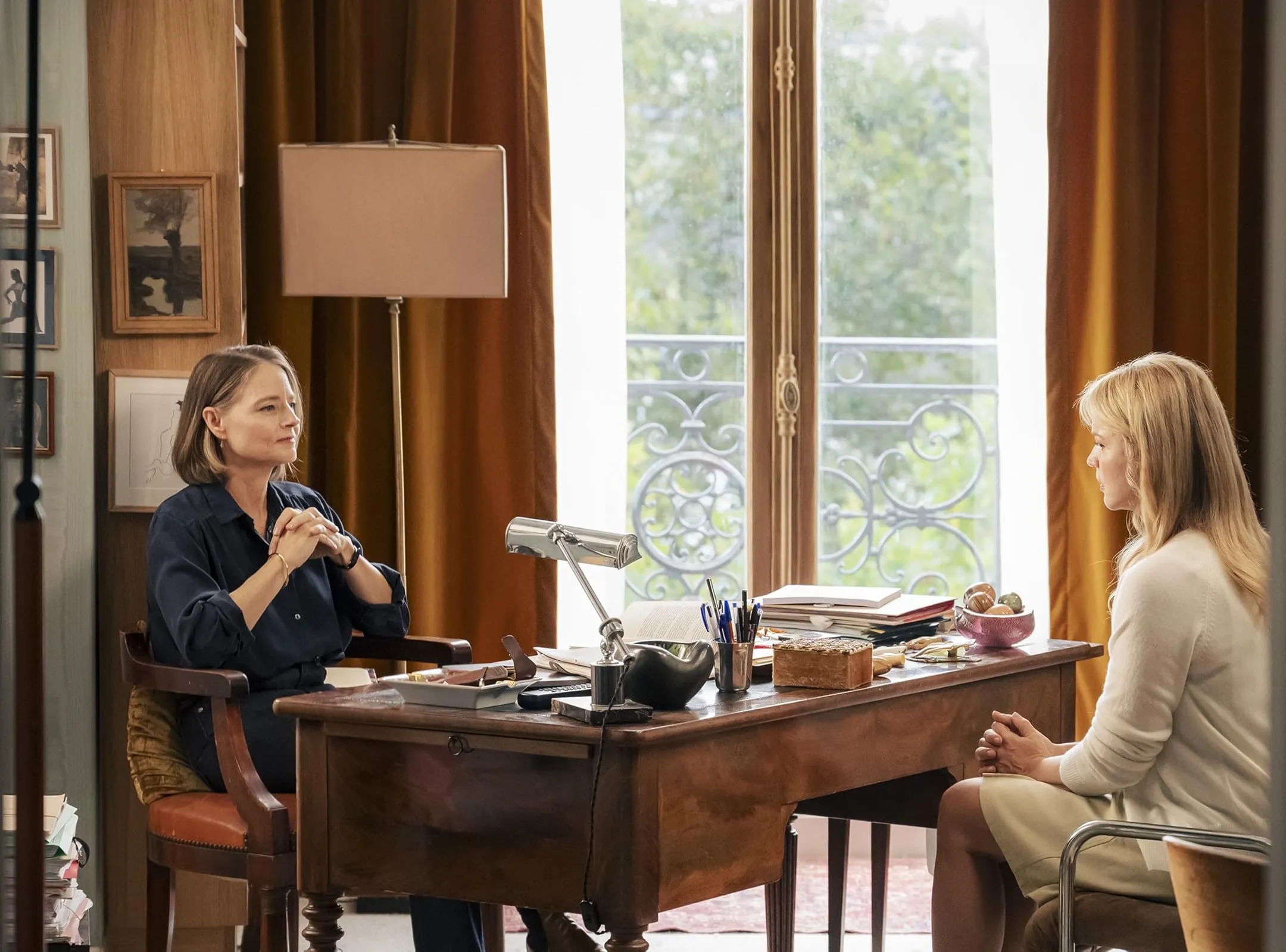Jodie Foster returns to French-language cinema under Rebecca Zlotowski’s direction, inhabiting Lilian Steiner, a Paris-based psychoanalyst whose meticulously ordered world fractures when a longtime patient dies under ambiguous circumstances.
Viewers are drawn into a dual narrative: a cerebral whodunit and a quietly stirring exploration of a rekindled romance with ex-husband Gabriel (Daniel Auteuil). The film moves between tense investigative moments—Lilian poring over MiniDisc recordings in her wood-paneled office—and unexpectedly warm interludes over shared bottles of Bordeaux.
Fleeting supernatural hints (snow-dusted flashbacks, hypnotic visions) punctuate the drama like poetic footnotes, while the City of Light itself—its polished stairwells, buzzy brasseries and hidden alleys—becomes a character in its own right.
Structure of Suspicions and Reveries
Lilian’s calm shatters when Paula, a patient she last saw weeks earlier, is reported to have died by suicide. Compelled to replay each session, she oscillates between blaming her own prescriptions and suspecting foul play.
Early confrontations with Paula’s widower Simon (Mathieu Amalric) crackle with hostility—he hurls accusations (“You knew her better than I did”) before slamming the door. A Nancy Drew–style break-in follows, courtesy of Gabriel’s faux flat-battery ruse, heightening both suspense and absurdity.
Then comes the hypnotherapy sequence. In trance-induced visions, wartime Paris drifts into view (complete with a dybbuk reference that nods to Zlotowski’s spiritualist interests), suggesting Lilian and Paula share a past-life bond.
These surreal passages coexist uneasily with Lilian’s domestic challenges: an estranged son, Julien (Vincent Lacoste), and a newborn grandchild she barely knows. The screenplay ticks between shadowed suspense and cozy reunion scenes so fluidly that tonal whiplash becomes a feature, not a flaw—each abrupt shift surprising the viewer into rethinking what kind of mystery this really is.
Faces Behind the Mask
Foster’s performance anchors the film. She speaks French with such precision that minor grammatical quirks feel like intentional windows into Lilian’s outsider status. One moment she’s the composed clinician; the next, tears stream unbidden (a “tear-duct short-circuit,” as she dryly describes it), exposing deep insecurities. A new term for this: psycho-thrillment—the fusion of therapeutic introspection with genre suspense.
Auteuil brings a warm gravitas, his “amiably ursine” presence softening tense scenes (including the stealth-entry into Simon’s home). Their chemistry undercuts paranoia with genuine affection: an ex-spouses’ dance, witty yet wistful. Amalric’s Simon is quietly unnerving—measured menace in every sideways glance—while Efira’s Paula haunts the narrative through flashbacks that evoke both sympathy and doubt.
Lacoste, as Julien, delivers a subdued performance that captures a son’s blend of resentment and reluctant concern. Their collective energy reveals how each character wears masks of professional poise or familial detachment, only to have those facades chipped away.
Crafting the Unseen
Visually, the film contrasts polished bourgeois interiors—bronze railings, mahogany walls—with stark dream-sequence snowscapes that feel both luscious and alien. Lighting shifts from warm domestic glow to the clinical cool of Lilian’s practice, underscoring her split between private warmth and professional detachment.
Sound design is mischievous: Talking Heads’ “Psycho Killer” plays over the credits only to be revealed as a neighbor’s stereo (a sly wink at genre conventions), while unexpected castanets slip into the score at oddly comic moments. City ambience—distant traffic, murmuring café patrons—seeps into suspenseful scenes, amplifying tension through everyday sounds.
Zlotowski’s direction flirts with genre boundaries: psychological thriller one minute, intimate comedy the next. She stages the hypnosis and break-in scenes with equal restraint and whimsy, riffing on classic noir motifs before gently undercutting them.
Underneath, the film meditates on memory, accountability and the echo of unseen histories. Lilian’s self-investigation mirrors her murder inquiry, asking how our own blind spots shape what we believe to be truth. The past-life motif raises a provocative question: if identity carries unseen legacies, can any of us claim full authorship of our lives? Such thematic undertows give A Private Life a cultural resonance that whispers long after the credits roll.
A Private Life premiered out of competition at the 2025 Cannes Film Festival on May 20, 2025. The film is scheduled for theatrical release in France on September 25, 2025, distributed by Ad Vitam.
Full Credits
Director: Rebecca Zlotowski
Writers: Rebecca Zlotowski, Anne Berest, Gaëlle Macé
Producers: Frédéric Jouve
Cast: Jodie Foster (Lilian Steiner), Daniel Auteuil (Gabriel Haddad), Virginie Efira (Paula Cohen-Solal), Mathieu Amalric (Simon Cohen-Solal), Vincent Lacoste (Julien Haddad-Park), Luana Bajrami (Valérie Cohen-Solal)
Director of Photography (Cinematographer): George Lechaptois
Editor: Géraldine Mangenot
Composer: Robin “Rob” Coudert
The Review
A Private Life
A Private Life offers a beguiling mix of psychological intrigue and intimate character study, anchored by Jodie Foster’s nuanced French-language performance and Rebecca Zlotowski’s playful genre shifts. Its tonal leaps occasionally wobble, but the emotional undercurrents and thematic depth make it a memorable cinematic puzzle.
PROS
- Jodie Foster’s fluency in French and emotional range
- Richly atmospheric Parisian settings
- Inventive blend of mystery, romance and surrealism
- Strong chemistry between Foster and Auteuil
- Thought-provoking themes of memory and identity
CONS
- Tonal shifts can feel abrupt
- Mystery lacks sustained suspense
- Subplots occasionally overcrowd the main narrative
- Hypnosis sequences may confuse some viewers
